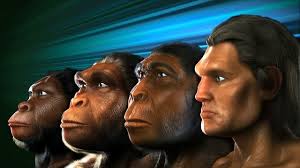Tattersall thinks the rise of a big brain may simply have been an evolutionary accident. He believes with Stephen Jay Gould that if you replayed the tape of life—even if you ran it back only a relatively short way to the dawn of hominids—the chances are "quite unlikely" that modern humans or anything like them would be here now.

"One of the hardest ideas for humans to accept," he says, "is that we are not the culmination of anything. There is nothing inevitable about our being here. It is part of our vanity as humans that we tend to think of evolution as a process that, in effect, was programmed to produce us. Even anthropologists tended to think this way right up until the 1970s" Indeed, as recently as 1991, in the popular textbook The Stages of Evolution, C. Loring Brace stuck doggedly to the linear concept, acknowledging just one evolutionary dead end, the robust australopithecines. Everything else represented a straightforward progression—each species of hominid carrying the baton of development so far, then handing it on to a younger, fresher runner. Now, however, it seems certain that many of these early forms followed side trails that didn't come to anything.












